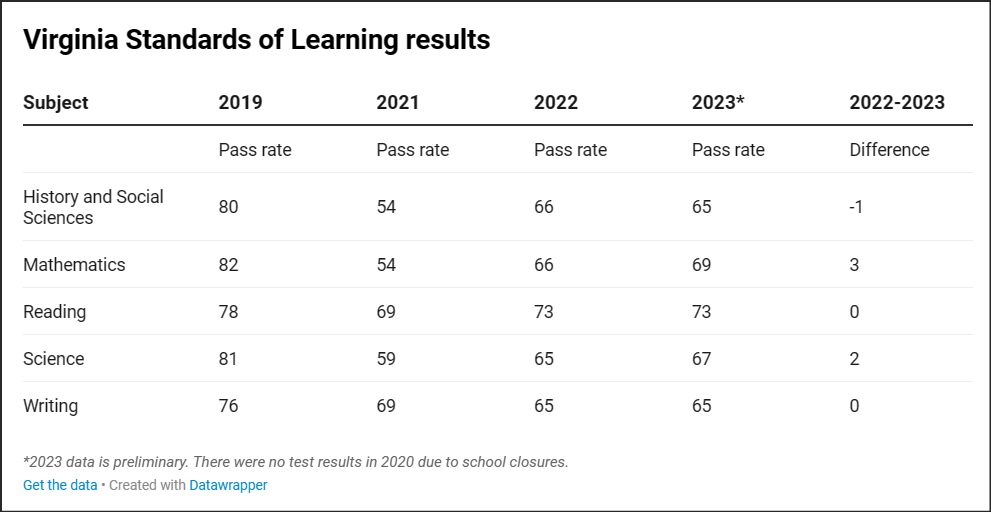
by James A. Bacon
The Virginia Department of Education is running two weeks late in releasing Standards of Learning (SOL) testing data for the 2022-23 school year. The reason cited by state Superintendent Lisa Coons, reports the Richmond Times-Dispatch, is to process retake data and appeals.
The SOL results, as they appeared on a Richmond Public Schools website before being taken down, were disappointing. Far from reverting to the pre-COVID norm, student achievement remained mired in a post-lockdown slump. Reading and writing scores were mostly unchanged, history/civic scores eroded, and math and science scores improved only a little.
The Youngkin administration has not commented on the results. The only quote cited by the Richmond Times-Dispatch comes from James Fedderman, president of the Virginia Education Association, who dishes out the usual social justice-style rhetoric calling for more money.
Too many student groups who faced significant additional barriers to learning during the pandemic, particularly Black, Hispanic, economically disadvantaged, special education, and English learner students, are still far behind pre-pandemic average pass rates on SOL tests. It doesn’t have to be this way. We need leaders brave enough to make the bold investments necessary to resource our classrooms and move Virginia out of the bottom tier of state K-12 spending.
Let’s set aside the massive K-12 funding increases already enacted by the General Assembly. Fedderman’s formulation ignores disruption caused by the COVID lockdowns (which the VEA cheered on), from which schools have yet to recover. The problem has nothing to do with “barriers” for disadvantaged students and everything to do with the breakdown in classroom and hallway discipline when they returned to school. Post-COVID, students at many schools were ungovernable. Fights were common. Students remained glued to their cell phones. Chronic absenteeism spiked. Adult authority collapsed. Demoralized teachers resigned in droves.
We can disagree on the reasons for this collapse, which occurred in varying degrees almost everywhere. Fetterman points vaguely to “barriers,” a code word for structural racism. I blame a combination of anarchic social forces and a collapse in the willingness of teachers and administrators to uphold traditional academic and disciplinary standards. What cannot be argued is that the breakdown took place and that it severely impacted learning.
I don’t have a sense of the degree to which the Youngkin administration appreciates the impact of anarchy in the schools on SOL scores. Public utterances from Team Youngkin have focused on rectifying culture-war issues initiated by the Northam administration (the teaching of race in history classes, guidelines for transgender students), addressing the chronic teacher shortage, and the entirely justifiable need to raise standards.
In a development entirely overlooked by the media, VDOE issued a press release yesterday announcing that the State Board of Education had unanimously passed new mathematics SOL standards. “The 2023 Math Standards will ensure Virginia’s students master mathematics skills before moving on to a new concept or course,” the press release summarized.
That’s good news for the long run. But students can’t master the higher standards until order is restored in classrooms.
Team Youngkin has said almost nothing about collapsing discipline, which is the domain of local school districts. While some districts have banned cell phones, most appear to be wedded to the same weak-minded policies that allowed disciplinary issues to proliferate. Until schools create an environment that allows teachers to teach, I don’t expect student achievement to improve materially.

Leave a Reply
You must be logged in to post a comment.